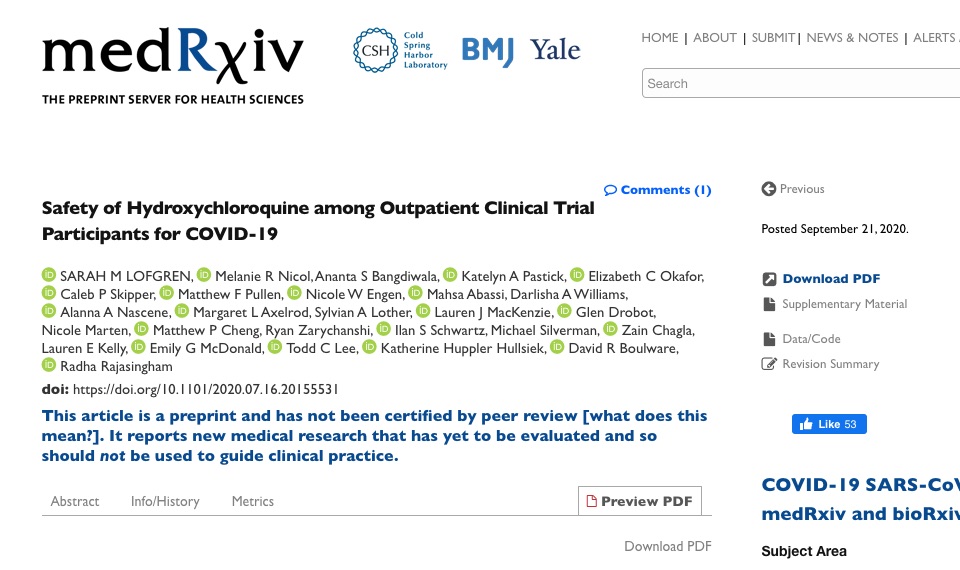Source: MedRxiv
View ORCID ProfileSARAH M LOFGREN, View ORCID ProfileMelanie R Nicol, Ananta S Bangdiwala, View ORCID ProfileKatelyn A Pastick, View ORCID ProfileElizabeth C Okafor, View ORCID ProfileCaleb P Skipper, View ORCID ProfileMatthew F Pullen, View ORCID ProfileNicole W Engen, View ORCID ProfileMahsa Abassi, Darlisha A Williams, View ORCID ProfileAlanna A Nascene, View ORCID ProfileMargaret L Axelrod, Sylvian A Lother, View ORCID ProfileLauren J MacKenzie, View ORCID ProfileGlen Drobot, Nicole Marten, View ORCID ProfileMatthew P Cheng, Ryan Zarychanshi, View ORCID ProfileIlan S Schwartz, Michael Silverman, View ORCID ProfileZain Chagla, Lauren E Kelly, View ORCID ProfileEmily G McDonald, View ORCID ProfileTodd C Lee, View ORCID ProfileKatherine Huppler Hullsiek, View ORCID ProfileDavid R Boulware, View ORCID ProfileRadha Rajasingham
Abstract
Introduction: Use of hydroxychloroquine in hospitalized patients with COVID-19, especially in combination with azithromycin, has raised safety concerns. Here, we report safety data from three outpatient randomized clinical trials.
Methods: We conducted three randomized, double-blind, placebo-controlled trials investigating hydroxychloroquine as pre-exposure prophylaxis, post-exposure prophylaxis and early treatment for COVID-19. We excluded individuals with contraindications to hydroxychloroquine. We collected side effects and serious adverse events. We report descriptive analyses of our findings.
Results: We enrolled 2,795 participants. The median age of research participants was 40 (IQR 34-49) years, and 59% (1633/2767) reported no chronic medical conditions. Overall 2,324 (84%) participants reported side effect data, and 638 (27%) reported at least one medication side effect. Side effects were reported in 29% with daily, 36% with twice weekly, 31% with once weekly hydroxychloroquine compared to 19% with placebo. The most common side effects were upset stomach or nausea (25% with daily, 18% with twice weekly, 16% with weekly, vs. 10% for placebo), followed by diarrhea, vomiting, or abdominal pain (23% for daily, 16% twice weekly, 12% weekly, vs. 6% for placebo). Two individuals were hospitalized for atrial arrhythmias, one on placebo and one on twice weekly hydroxychloroquine. No sudden deaths occurred.
Conclusion: Data from three outpatient COVID-19 trials demonstrated that gastrointestinal side effects were common but mild with the use of hydroxychloroquine, while serious side effects were rare. No deaths occurred related to hydroxychloroquine. Randomized clinical trials can safely investigate whether hydroxychloroquine is efficacious for COVID-19.
Competing Interest Statement
Personnel was supported through the Doris Duke Charitable Foundation through a grant supporting the Doris Duke International Clinical Research Fellows Program at the University of Minnesota. Katelyn Pastick and Elizabeth Okafor are Doris Duke International Clinical Research Fellows. Sarah Lofgren is supported by the National Institute of Mental Health (K23MH121220). Caleb Skipper is supported by the Fogarty International Center (D43TW009345). Drs. Melanie Nicol, Radha Rajasingham, and Matthew Pullen are supported by the National Institute of Allergy and Infectious Disease (K08AI134262, K23AI138851, T32AI055433). Margaret Axelrod is supported by NIH T32GM007347 and F30CA236157. Drs. Lee and McDonald receive salary support from the Fonds de recherche du Quebec Sante. Canadian funding was received from various sources. In Quebec, funds were received from the Clinical Practice Assessment Unit of the McGill University Health Centre and the McGill Interdisciplinary Initiative in Infection and Immunitys Emergency COVID-19 Research Funding. In Manitoba, research support was provided from the Manitoba Medical Service Foundation. In Alberta, support was provided by Northern Alberta Clinical Trials and Research Centre. In Ontario, support was provided by the Research Institute of St. Josephs Hamilton, the St Josephs Hospital Foundation in London, and Bridge to Health Medical and Dental. Purolator Canada provided in-kind courier support for Canadian sites participating in the post-exposure and early treatment trials. Apotex Pharmaceuticals Canada provided a donation of some of the hydroxychloroquine tablets used. Rising Pharmaceutical donated some of the medicine for U.S. trials. COVID-19 Emergency Supplement funding was requested from the National Institutes of Health for each of the three trials.
Clinical Trial
NCT04308668 for post-exposure prophylaxis and early treatment trials. NCT04328467 for pre-exposure prophylaxis trial.
Funding Statement
This work was supported by Jan and David Baszucki, Steve Kirsch, the Alliance of Minnesota Chinese Organizations, the Minnesota Chinese Chamber of Commerce, and the University of Minnesota.
Author Declarations
I confirm all relevant ethical guidelines have been followed, and any necessary IRB and/or ethics committee approvals have been obtained.
Yes
The details of the IRB/oversight body that provided approval or exemption for the research described are given below:
IRB approval occurred at McGill University, Clinical Trials Ontario, University of Manitoba, and University of Alberta, and the University of Minnesota.
All necessary patient/participant consent has been obtained and the appropriate institutional forms have been archived.
Yes
I understand that all clinical trials and any other prospective interventional studies must be registered with an ICMJE-approved registry, such as ClinicalTrials.gov. I confirm that any such study reported in the manuscript has been registered and the trial registration ID is provided (note: if posting a prospective study registered retrospectively, please provide a statement in the trial ID field explaining why the study was not registered in advance).
Yes
I have followed all appropriate research reporting guidelines and uploaded the relevant EQUATOR Network research reporting checklist(s) and other pertinent material as supplementary files, if applicable.
Yes
Hydroxychloroquine Reduces Risk Of Death From COVID-19 By 30%, Latest Italian Study Shows

